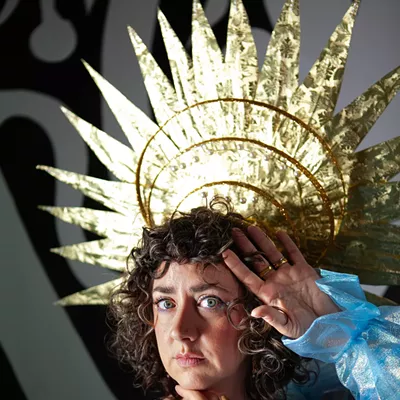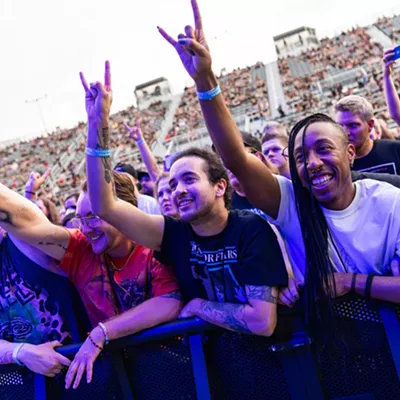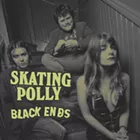As of last Friday, none of Jack Sheehy's bandmates had heard from him in more than a month. Seaweed Jack's bassist, a native of the Bay Area, had spent the year planning a move back to San Francisco. As far as drummer Anthony Stassi knew, Sheehy had executed that plan. "We're hoping he'll be back by next weekend," Stassi remarked, shrugging.
It's not as though the rest of the band would have been available to take his calls even if Sheehy felt like offering his itinerary, though. In the days before the release of Seaweed Jack's second full-length album, Haunt, everyone except Stassi was out of town. A couple were out of country. Guitarist Brian White spent the summer studying in Florence, Italy. Geoff Doolittle, the band's primary songwriter, spent a week in Glasgow, Scotland, with his grandmother. With a CD release party on Saturday and a subsequent three-week tour of the coast, the diaspora came at the point most bands would be circling the wagons. At the moment, Seaweed Jack haven't even practiced.
White returned from abroad with a mustache and a year to go in school. Doolittle came back to a tent, a sleeping bag, and no home to speak of. Stassi was there waiting when they returned, "unemployed as hell," and living in adulterous proximity to another band. The home Seaweed Jack had built for itself last spring out of sheer idealism, during Doolittle and Stassi's final days of college, is broken.
The disc they're birthing into this fragmented family is called Haunt. It's a monumental improvement over their first artifact, The Captain, a disc that made them stars and heroes. The Captain was a flawed, overlong fever dream of an album, they thought, thrown together in a flurry not long after the band's current lineup coalesced. More than fame, The Captain had given them a reason to stay together, stay in Spokane, and try to make something better.
They'd just buckle down, work their asses off, starve for their art and put out a truly great album while waiting for White and Sheehy to graduate. With the rabid fan base they had in Spokane and the amount of buzz they were getting in Seattle, there was cause for optimism.
Things just never really took off, though, and less than a month after Sheehy graduated, he was out. The band talks of tension and ennui and savage writer's block sapping their momentum. Haunt isn't their truly great album, then, but it's an important one, showing a band come of age under adversity, and possibly tearing itself apart in the process. It's a more confident record, a better record, and a mercifully shorter one. There's more variety, a greater range of tempo, better songwriting and more to like in Haunt's brief 29 minutes than in The Captain's digressive 72. There is, for the first time, some clangy pop to go with the ghostly pomp. The major influences (Modest Mouse, Tom Waits) are still present, but they're set adrift in a sea of double-tracked vocals, crashing Wurlitzer, and the fluttering vibrato of a Leslie speaker.
If it ends with Haunt, I ask, what does that say? "We were moving in a good direction," says Doolittle. "I think we had talented people capable of doing good things, and we were progressing." This isn't the first question Doolittle has answered with the past tense. Sad and frustrated and accomplished -- if Haunt is the last thing they ever put out, it'll be fitting.
In tone and body language, he and Stassi seem to feel the band's demise is looming if not already foregone. Doolittle's final remark on the subject puts into words the pallor that's hung over a year's worth of hard-fought writing sessions and gloomy, infrequent shows. "More than anything," he says, "I'm glad we got Haunt done."
Getting morose over Fleetwood Mac, the two marvel that there's no bad blood. The band isn't actively breaking up, Doolittle insists. The four of them are still open to being Seaweed Jack. After the tour, they're each just going to plan their separate lives and see how well the band survives the growing distance.
The way they're falling apart, then, is similar to the year they spent trying to keep it together. They were open to success, and they'd take it if it came by. They couldn't though, as a group, muster much proactivity. It shows in Doolittle's wan assessment of their promise. "I still feel like we're the perfect band for a producer and a little bit of cash." Of course, neither of those things was forthcoming.
A slow suicide by neglect on both counts, the kind of thing that could be reversed with a favorable break. Everyone though, seems pretty comfortable with that cause of death. White has school, Stassi has Hockey, Sheehy has San Francisco. Doolittle, he's got a sleeping bag, a tent, and no clear plan beyond the 20-day tour the group has planned in support of Haunt. At some point during the year -- and maybe even before -- Doolittle says, the bandmates started looking after their individual needs. "'Yeah, the band's going great, guys,'" he says, mimicking the sentiment, "I'm just going to go get that job at the insurance company.'"
It's a long drop from a failed ideal, but the band cushions it with pragmatism. Even Doolittle, the idealist, the one most devoted to being an artist in the big, romantic sense, is beginning to buy in. If it comes to a competition about which ex-member has created the best life after Seaweed, "there's nothing I'd like more than to see the former members of Seaweed Jack crash and burn," he says with a smile, then a guffaw. Stassi cackles. "I laugh to keep from crying."
Monday morning, Doolittle relented and called Sheehy, learning that the bassist would return to Spokane on Friday, one night before Haunt's release party. Neither Stassi nor Doolittle seemed much bothered by this. "That'll give us one practice max," the singer said.
"Seems about right," Stassi replied.
Seaweed Jack with Hockey and Broken Smokes at the Big Easy on Saturday, July 14, at 7:30 pm. $5. Call 244-3279.



















